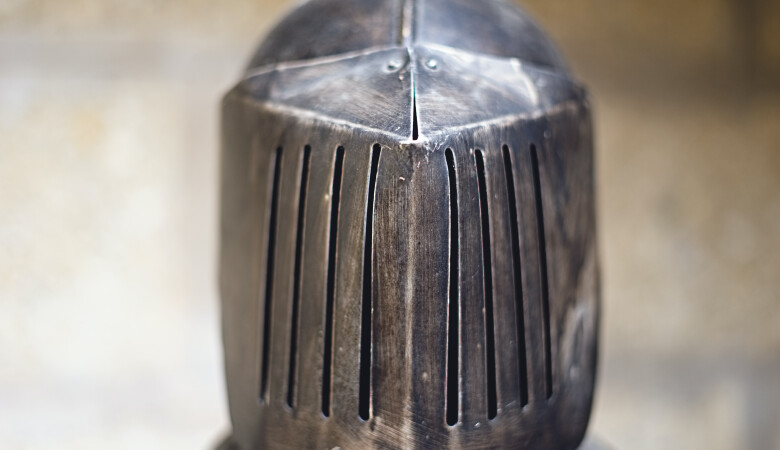When God Calls You to Mourn for Sin, Don't Party Instead (Isaiah Sermon 23 of 80)
August 19, 2012 | Andy Davis
Isaiah 22:1-25
Repentance, Judgment, Prophecy
Pastor Andy Davis preaches a verse-by-verse expository sermon on Isaiah 22:1-25. The main subject of the sermon is that we should respond appropriately when God reprimands us for sin.
- SERMON TRANSCRIPT -
I. Introduction
This morning I am going to resume a sermon series in the Book of Isaiah, which I left about four years ago. Some of you were here at that time. We’re parachuting in, right in the middle of the book, to Chapter 22. As we come to Isaiah in general, as you heard a little bit in my prayer a moment ago, one of the challenges you have as you look at the Old Testament, as you look at Isaiah, is the question of relevance. How is this connecting to me, what’s happening in Isaiah and what’s happening in my life? Is there an unsurmountable gulf between the two?
The answer is, of course not. All scripture is God-breathed and useful for teaching, rebuking, correcting, and training in righteousness, so we may be thoroughly equipped for every good work. This chapter in particular has a powerful message to us. It’s important for us to hear. You heard, as Blake was reading, this rather familiar phrase: “Let us eat, drink, and be merry, for tomorrow we die.” So the issue in Isaiah 22 has to do with a sinful, wicked happiness, a wicked feasting that seeks to avoid the real spiritual issues that are going on. It seeks instead to get quickly to the party, to get quickly to a frivolous joy that doesn’t address the deeper spiritual issues. There’s nothing wrong, and I say there’s everything right, with the God-given desire to be happy. There’s nothing wrong with that. To be happy, to celebrate, to eat and drink and be merry, these things are wired into us.
Jesus did it a lot in His ministry, didn’t He? He seemed to go from one feast to the next, from one banquet to the next. Think about when Matthew turned from his sins and followed Jesus, leaving his tax-collecting booth. That evening he had a big party with all of his friends. They happened to be what were known as tax collectors and sinners. Jesus was there feasting with them. And the Pharisees and scribes were complaining about this, saying to His disciples, “Why do you eat and drink with tax collectors and sinners?” Jesus answered them, “It is not the healthy who need a doctor but the sick. I have not come to call the righteous, but sinners to repentance.” (Luke 5:31-32)
He did it in the context of a banquet. But they spoke wrongly about him. Jesus says this, “The Son of Man came eating and drinking, and they say, ‘Here is a glutton and a drunkard, a friend of tax collectors and sinners.’” (Mt 11:19) The first half is wrong. The second half (Amen), is true. Jesus is a friend of sinners. What a joy that is! There’s nothing wrong with desiring to feast.
Jesus actually told a parable in which He described an aspect of our heavenly experience as a wedding banquet, a banquet spread by a king. “The kingdom of heaven is like a king who prepared a wedding banquet for his son.” (Mt 22:2) And then a few verses later, he sends out messengers, saying, “’Tell those who have been invited that I have prepared my dinner: my oxen and fattened cattle have been butchered and everything is ready. Come to the wedding banquet.’ But they paid no attention and went off...” (Mt 22:4-5) The great sin of the people in that parable is that they didn’t come to the banquet. They didn’t come to the feast. They had other things they wanted to do.
So the desire to eat and drink and be merry, there’s nothing wrong with it. It’s perfectly fine if you seek it in the hands of God, by His holy means. Absolutely. But Jesus was also called a man of sorrows and familiar with suffering. The paradox, then, of the Christian faith is that it’s only by dealing properly with our sinfulness that we will be able to sit at the table with the perfect source of happiness, who is the Holy God. It’s only as we have our sins addressed and atoned for. Therefore, Jesus said, “Blessed [or happy, richly happy] are those who mourn, for they will be comforted.” (Mt 5:4) The yearning for happiness is built into the human soul. Blaise Pascal put it this way, “All men seek happiness. This is without exception. Whatever different means they employ, they all tend to this end. The cause of some going to war, and of others avoiding it, is the same desire in both, attended with different views of what will make them happy. This is the motive of every action of every man, even of those who hang themselves.”
We seek happiness all the time. This sermon, this text, is not against happiness. It’s not against eating and drinking and being merry. That’s not it. Rather, the whole message of scripture points to a higher banquet, a higher feast, an eternal banquet, a heavenly banquet of joy in the presence of a holy God. Because this God is holy, we must have our sins atoned for. We must be atoned for. Our sins must be covered.
The scripture says that the atonement for sins is only worked by the blood of Jesus shed on the cross. God sent His Son into the world to atone for our sins, that His blood shed on the cross might be full atonement for our sins. But in order to access that atonement we must repent and believe the good news. Jesus said, in Mark 1:15, “The time is at hand. The kingdom of heaven is near. Repent and believe the good news!” Now, repentance always involves the true sight of sin as it really is. We see it by faith. We see at last, sin, as the grotesque, wicked thing it is. We see it in ourselves and genuine repentance always involves some sorrow for sin.
Jesus’ blood is, in some mysterious way, mingled with our tears to produce our own salvation. We have that woman, of course, who was a harlot, a prostitute, who comes in when Jesus is at one of those banquets. I think it was at the home of Simon the Leper. She’s weeping over Jesus’ feet and rinsing His feet with her tears, drying them with her hair. That’s a picture of her brokenness over her sin, her weeping those tears. Now, they’re not equal value, those substances. Jesus’ blood, our tears, both equally important, I’m not saying that. What I am saying is that when the Holy Spirit works genuine repentance and faith, then sorrow for sin is going to be part of your life. It’s part of the healthy Christian life. At the very beginning, sometimes you have such an overwhelming sense of your own wickedness. That’s why you’re running to Jesus. In the same way that woman just couldn’t stop crying. She’s bathing Jesus’ feet with her tears.
In Isaiah 22, we have pictured some people who want to feast and celebrate rather than weep and mourn over sin. They’re the ones that are saying, “Let us eat and drink for tomorrow we die.” I think the lesson that Isaiah the prophet gives us here in 21st century language is, “When God calls on you to mourn for sin, don’t party instead.” It’s not time for partying. It’s time for mourning. There is a time for that in Christian life.
II. Jerusalem Besieged Like Any Other Sinful City (vs 1-8a)
Context: God’s Sovereign Power Over All Nations
Let’s look at these verses in an orderly way. First, in verses 1-8, we have revealed for us through the vision of Isaiah the prophet, that Jerusalem, the City of David, will be besieged. And it will be dealt with like any other wicked city. Now, the context here is that Isaiah is presenting a God who is sovereign over all nations. Later in Isaiah we will be told He sits enthroned above the circle of the earth and all its peoples before Him are like grasshoppers. The nations are like dust on the scales. They’re like a drop from the bucket. He is reigning on a heavenly throne over all of these things. Before Him, all the nations are as nothing. They’re regarded by Him as worthless and less than nothing. Later in Isaiah, in Chapter 34, it says, “The Lord is angry with all nations; his wrath is upon all their armies. He will totally destroy them, he will give them over to slaughter.”
In Isaiah chapters 13 through 35, we have one chapter after another after another presenting God as the master of all nations, the ruler of all nations. He’s king over all the earth. There’s one oracle after another against all of these Gentile nations. They just come one after the other: Assyria, Philistia, Moab, Damascus (the capital of Syria), Ethiopia, and Egypt. Chapter after chapter in Isaiah, we see oracles of judgment against Gentile nations. In Chapter 21, as a matter of fact, three nations get it. Babylon gets it, as well as Edom and Arabia. God’s wrath is against these three different Gentile nations.
Such a view of a single, all powerful God who rules over all the earth was in some ways, or at least to some people, new and foreign. They believed in national deities, the god of the Moabites, the god of the Assyrians, etcetera. They had national temples that would be set up. When one nation went to war against another, it would be their gods, god, or goddess against the other nation. They would see whose gods or goddesses were stronger. No, Isaiah has a whole different vision. It’s not like that at all. God rules over all the Earth, and He’s against sinners in every nation.
Bitter Surprise: Judah and Jerusalem No Different than Gentile Sinners
Such a view of the God of Abraham, Isaac, and Jacob, the God of the Jews, wrath-filled towards wicked pagans, bringing judgment on wicked pagan nations, would have brought delight to any patriotic Jewish heart. They would have looked at that and said, “Go get them, God! Go whip up on those wicked Gentile nations!” But we have a shock in Isaiah 22. Jerusalem is going to be destroyed like any other wicked city. God turns his oracle, through Isaiah, against the Jews of Jerusalem. In one sense, they’re no different than any Gentile. In another sense, they’re worse because they live in the Valley of Vision and they should have known better. They should have lived better. They had God’s word proclaimed to them in every generation. They should have lived at a higher level, and they didn’t.
The Valley of Vision: Jerusalem More Accountable Because of Prophets
So in one sense, it’s worse. Jerusalem is more accountable because of the prophets. Look at verse 1. It says, “An oracle concerning the Valley of Vision.” There’s a well-known book of Puritan prayers that takes its title from this chapter, “Valley of Vision.” “Valley” because Jerusalem is surrounded by three very significant valleys, and itself, in some sense, can be looked down upon from the Mount of Olives and some of the other immediately surrounding mountains. So it is a little bit lower.
That’s the valley part. Valley of Vision. “Vision” because Isaiah had one vision after another. He’s not the only one. The fact is that God has communicated with Jerusalem in every generation, generation after generation, through the prophets. He gives them visions. He gives them the word. The word of the Lord comes to this or that prophet, and they proclaim God’s will, God’s words to the people. Valley of Vision. But they have not responded. They have not received the word. They have rejected it so much so that Jesus, looking back over the whole history of the city of Jerusalem, weeping over it, says, “O Jerusalem, Jerusalem, you who kill the prophets and stone those sent to you, how often I have longed to gather your children together, as a hen gathers her chicks under her wings, but you were unwilling. Behold, your house is left to you desolate.” (Mt 23:37-38) Or again, look at Stephen when he was about to be killed. As he’s getting to the end of his incredible sermon in Acts, Chapter 7, he says, “You stiff-necked people, with uncircumcised hearts and ears! You are just like your fathers, you always resist the Holy Spirit! Was there ever a prophet your fathers did not persecute?” (Acts 7:51-52)
The Siege Described
Jerusalem is the Valley of Vision. God gave them the gift of visions, but they did not listen. They resisted the prophets in every generation. So Isaiah describes the siege. Look at verses 1-3. Speaking to Jerusalem, he says, “What troubles you now, that you have all gone up on the roofs, O town full of commotion, O city of tumult and revelry? Your slain were not killed by the sword, nor did they die in battle. All your leaders have fled together; they have been captured without using the bow. All you who were caught were taken prisoner together, having fled while the enemy was still far away.”
The city, Jerusalem, is filled with tumult and revelry, a city of laughter and lust, of eating and drinking and making merry, a city of bloodshed, wickedness, covetousness, greed, and sexual immorality. It was a party city in some ways, but now no longer. Now it’s a city of the dead. Isaiah mentions, “Your dead were not slain in battle.” They have dead people there, but why are they dead? Because of the siege. They’re dead because of starvation. They’re dead because of plague, disease. A city in which the leaders of outlying towns and cities have fled to the final citadel of Judah, Jerusalem, to save their lives. They didn’t fight out there. They had no courage, no strength to face the invader.
No, they run to Jerusalem for protection from Jerusalem’s walls. But there will be no protection there. The invaders have now come and surrounded Jerusalem and there will be no escape. This, in verse 5, is the Day of the Lord. It’s a theme that’s brought up again and again in the Old Testament, the Day of the Lord. The Lord Almighty has a day in store. Do you see it? It’s the Day of the Lord, it’s His day. “The Lord, the Lord Almighty, has a day of tumult and trampling and terror in the Valley of Vision, a day of battering down walls and crying out to the mountains.” (Is 22:5) This is a Day of Judgment, this day of wrath. There have been many of them in redemptive history. Again and again God brings a temporal judgment on a people. It’s a picture of the final Day of the Lord at the second coming of Christ, in which judgment will come finally in the end.
It says in Romans 2:5-6, “But because of your stubbornness and your unrepentant heart, you are storing up wrath against yourself for the day of God’s wrath, when his righteous judgment will be revealed. God will give to each person according to what he has done.” So that’s the final Day of the Lord, what we call the day of judgment. But there are smaller Days of the Lord that happened along the way. Isaiah says, “This is a day of tumult and trampling and terror.” He says, “It’s a day of battering down walls.” Do you see that in the text? “Battering down walls and of crying out to the mountains,” looking for a place of refuge, calling or crying out to the hills, to the mountains. “Fall on us and cover us!” But there is no refuge.
So what is this? What is Isaiah talking about? This is the destruction of Jerusalem by the Babylonians. This is not the invasion under the Assyrians. He covers that in other places in his prophecy. There, God said plainly to Sennacherib and to the Assyrian army, “You will not even approach the walls, and you certainly won’t build a siege ramp against it, and you will not batter them down. You’ll die before you even get there.” One hundred and eighty-five thousand Assyrians died in one night. Well, that’s not what this passage is talking about. No, because godly King Hezekiah, when he heard the reports of the Assyrians coming and when he saw what was happening, he humbled himself in sackcloth and ashes, cried out, and grieved over his sin, as did the city of Jerusalem. They pleaded with God to forgive them. They asked for mercy and God granted it to them. But in this chapter, there’s none of that going on.
No, at the time of Nebuchadnezzar and the Babylonian invasion, the king was Zedekiah, a wicked man. All he sought was escape. He actually went out with some of his nobles, through the openings in the wall, and ran at night, trying to escape. What a coward. That’s somewhat included in this chapter. “Your leaders have all fled. They didn’t fight. They didn’t have the strength to take up bow and arrow or shield. They didn’t do that. They ran for their lives. That’s the kind of leaders you have, O Jerusalem.” Well, those are the days of Zedekiah, the days of Babylon. That’s what Isaiah’s talking about.
Isaiah’s Overpowering Reaction
In verse 4, we have Isaiah’s overwhelming reaction to this prophecy. This is the prediction of the destruction of Jerusalem, the city of his own people. Look what he says in verse 4. “Therefore I said (this is Isaiah speaking) Turn away from me; let me weep bitterly. Do not try to console me over the destruction of my people.” Jeremiah is called the weeping prophet, but I think Isaiah did plenty of his own weeping too.
Isaiah is overcome with grief for the destruction of Jerusalem, overcome with grief over his own people. It’s a grievous thing when God’s own people break the covenant, the holy covenant. When, through their wickedness and sin, God brings final judgment on them. God himself is highly emotional about sin. He’s an emotional being. You get your emotions from Him. You’re created in His image. God has emotional reactions to our sins. We’re told in Ephesians 4:30, “Do not grieve the Holy Spirit of God, with whom you were sealed for the day of redemption.” Grief is a serious sadness, a deep-rooted sadness that comes. Think about some of the tragedies that happen in life, even someone getting hit by a car and almost dying, or maybe a toddler that actually does get killed, and the grief that come over that. It’s frequently associated, I think, with death for the most part.
The Holy Spirit is grieved when we sin. It’s an emotional reaction. Later, God will say in this text that He called on the people to grieve too. “I’m grieving,” God is saying, “You should grieve too. We should be in unity on this, because of the sin.” Isaiah’s already doing it. He’s grieving over the destruction of his people and over the sins that brought it about. He’s weeping over it, saying, “I can’t be consoled.” What’s really amazing about this is that this is a prophecy one hundred and fifty years before this even happens. Think about that. This is about a century and a half before this stuff will even happen, and God gives Isaiah this vision. Maybe he’s writing it down on a scroll and puts down his pen, and starts to weep over it. He’s already doing it.
Elam and Kir: Distant Enemies, Well-Prepared for Conquest
Now, he mentions Elam and Kir in verses 5-6. These are distant enemies, Gentile nations, who are going to come and do the job. “The Lord, the Lord Almighty, has a day of tumult and trampling and terror in the Valley of Vision, a day of battering down walls and crying out to the mountains. Elam takes up the quiver, with her charioteers and horse; Kir uncovers the shield.” Isaiah is a stunning and amazing prophecy. It’s just incredible to me. He moves back and forth from section to section across centuries of time, without even stopping. I think of an eagle that’s on the peak of one mountain and wants to go to the peak of another mountain. It flies there in about three minutes. Whereas if we try to climb, we’d have to descend one slope and go up another. It would take us all day, or maybe two.
But Isaiah, with the eagle eye of prophecy, can go from one century to the next and back again, no problem. Elam and Kir, they actually are the very people that God, in Chapter 21, is going to raise up to destroy the Babylonians. They are the Medes and Persians, ultimately. But before that ever happens He’s going to use them to destroy Jerusalem. They’re going to come with chariots and siege instruments and all that. They’re going to be victorious. They’re going to win.
Jerusalem Stripped
Verse 7 says, “Your choicest valleys are full of chariots, and horsemen are posted at the city gates.” Verse 8, “The defenses of Judah are stripped away.” They are defenseless. The walls are broken down. They have nothing left. They’re going to be destroyed. The siege is devastating. All of Judah’s protection is gone. Judah is stripped and laid bare, ready for the plundering. That’s verses 1-8.
III. What Jerusalem Should Have Done: Faith and Repentance (vs 11-12)
The Visions of the Prophets Had Warned Jerusalem of This for Centuries
All right, now what should Jerusalem have done? None of this has happened yet, when Isaiah gives the word, when he gives the prophecy. He’s just predicting what’s going to happen. What should they have done? Well, they should have had faith toward God and repentance toward their sins. It’s a double vision. It’s two sides of the same coin. Toward God you look. You look toward God. It’s a look of faith. You’re going to look to God and trust in Him. You’re going to look towards your sins and grieve over them. It’s the same thing, really. That’s what they should have done.
The visions of the prophets had warned the people of Jerusalem that this was coming. They knew it was coming. I already told you that this is one hundred and fifty years before the fall of Jerusalem. Plenty of warning. The Valley of Vision, one hundred and fifty years ahead of time. Isaiah himself had said, “God is not pleased with the Jews. He’s not pleased with your religious system, your animal sacrifices.” “What are they to me?” says the Lord. “I don’t care about this river of blood, animal after animal that you’re sacrificing. I’m sick of it, frankly. I have more than enough of the blood of fattened rams and lambs and all that.” “Wash and make yourselves clean. Take your evil deeds out of my sight! Stop doing wrong, learn to do right! Seek justice, encourage the oppressed. Defend the cause of the fatherless, plead the case of the widow. ‘Come now, let us reason together,’ says the Lord Almighty. ‘Though your sins are like scarlet, they shall be white as snow; though they are red like crimson, they shall be like wool. If you are willing and obedient, you will eat the best from the land; but if you resist and rebel, you will be devoured by the sword. For the mouth of the Lord has spoken.’” Isaiah 1:16-20
I think that’s very clear. In Isaiah 5, he actually tells them a variety of their sins: their drunkenness, their social oppression, their taking of widows’ houses and adding house to house till no space is left in the land, and all of the wickedness. It’s very, very plain in Isaiah’s prophecy. They know exactly what God thinks about the way they’re living. So that was warning enough. Isaiah is enough.
Major Warning: The Exile of the Northern Kingdom of Israel to Assyria
Then as time goes on, Assyria invades. The Northern Kingdom, the ten tribes, they get destroyed and swept away into exile. That’s a pretty strong warning, don’t you think? It’s warning to Judah, “This could happen to you.”
Even Clearer: The Babylonians Were Coming
It’s even clearer when these events actually start happening and you’re in the city of Jerusalem. Nebuchadnezzar starts conquering some of the little kingdoms north of you, one after the other after the other. Assyria falls to the Babylonians. Tyre falls to the Babylonians. Nebuchadnezzar is coming. And at that same time you have Jeremiah the prophet saying plainly what’s going to happen. He’s using exactly the same language as Isaiah did. You can read about it in Jeremiah 4:4-8. “Circumcise yourselves to the Lord; remove the foreskin of your hearts, O men of Judah and inhabitants of Jerusalem; lest my wrath go forth like fire, and burn with none to quench it, because of the evil of your deeds. Declare in Judah, and proclaim in Jerusalem, and say, ‘Blow the trumpet through the land; cry aloud and say, ‘Assemble, and let us go into the fortified cities!’ Raise a standard toward Zion, flee for safety, stay not, for I bring disaster from the North, and great destruction. A lion has gone up from his thicket, a destroyer of nations has set out; he has gone out from his place to make your land a waste; your cities will be ruins without inhabitant.” Listen to this, this is Jeremiah 4:8. “For this put on sackcloth, (Do you hear that?) lament and wail, for the fierce anger of the Lord has not turned back from us.” It’s the same message, before it happens.
Isaiah Spoke to them 150 Years Ahead of Time, Telling Them What to Do
When, in our text, it says, “The Lord Almighty called you in that day,” that’s Jeremiah doing that. Do you see that? He’s going to send Jeremiah to go say, “Put on sackcloth and cry and wail.” God spoke to them. So what should they have done? First, they should have looked to the Lord. Verse 11 speaks of all the military preparations they make. More on that in a moment, but look at verse 11. “You built a reservoir between the two walls for the water of the Old Pool, but you did not look (Do you see the word “look?”) to the One who made it, or have regard for the One who planned it long ago.” What’s that “look?” It’s faith, friends. It has to do with what you trust. You looked to this, but you should have looked to God. Does that make sense? As Isaiah 45:22 says, “Look unto me, and be saved, all the ends of the earth: for I am God, and there is no other.” The KJV keeps the “look.” All the others say, “Turn to me,” but KJV has “look.” So it’s a look of faith, right? Look to God. Trouble is coming. Look to God with the eyes of your heart, which is faith. By faith, see Him who is invisible.
Second, look to your sins and grieve over them. Look at verse 12. “The Lord, the Lord Almighty, called you on that day to weep and to wail, to tear out your hair and put on sackcloth.” This is an expression of great grief over sin. Grief! Grief! You look and you see your sins. They call you to cry out against yourself. I don’t know that it’s literally that you’re going to rip the hair out of your head, but there’s this sense of intensity. “God, how could I do this against you? How could I sin against such a God as you?”
There’s a crying out against yourself. You put on sackcloth because it’s rough, and you’re like, “I don’t want comfort. I don’t want earthly consolations now. I don’t want an earthly party. I have sinned against God.” That’s what it’s calling on you to do. Take your sins seriously. Grieve over it. That’s what they should have done. The New Testament version is in James 4:8-10. “Come near to God and he will come near to you. Wash your hands, you sinners, and purify your hearts, you double-minded. Grieve, mourn, and wail. Change your laughter to mourning, and your joy to gloom. Humble yourselves before the Lord, and he will lift you up.” That’s what they should have done, looked to the Lord, looked to their sins, and grieved over them. What did they do? Well, they made faithless military preparations and they had a party. That’s what they did.
IV. What Jerusalem Did: Faithless Preparations and Feasting (vs 8b-11,13)
Avid Military Preparations
I mean, they got ready for the Babylonians to come. They shored up their defenses as best they could. They made preparations, first described in verse 8. “You looked in that day to the weapons in the Palace of the Forest.” That was their armory. So they went and counted their weapons. “All right, we have X number of swords, X number of shields. We have bows and arrows. All right, good. We’re ready.”
Look, there’s nothing wrong with making military preparations. The Old testament has a lot of examples of godly people who made military preparations. That’s not the issue. The issue is that they did that but did not look to the Lord. It’s a contrast. They were trusting in the weapons, trusting in the military. They were not trusting in God. You’ve heard the World War II saying, “Praise the Lord and pass the ammunition.” Well, this was just “pass the ammunition.” They skipped the Lord part. So they were trusting in the weapons. Verses 9-11 says, “You saw that the City of David had many breaches in its defenses, you stored up water (You’re going to need water) in the Lower Pool.” You need water for the siege. “You counted the buildings in Jerusalem and tore down houses to strengthen the wall.” You need some more building materials for the gaps in the walls, so you tore down the houses that weren’t needed. You took the rubble and the wood, and you shored up the defenses of the wall. “You built a reservoir between the two walls for the water of the Old Pool.” There’s nothing wrong with that. But they did not look to God while they were doing it.
Fleshly Celebration
Secondly, they had a fleshly celebration. They had a party. Look at Verse 13. “But behold, there is joy and revelry, slaughtering of cattle and killing of sheep, eating of meat and drinking of wine! ‘Let us eat and drink,’ you say, ‘for tomorrow we die.’” Having done their military preparations, they felt secure. It was time for a feast, time to have a party.
It’s a bit odd when you’re about to go through a siege. You really should be conserving food when people are going to be on rations for a while, don’t you think? But it’s an arrogance, a confidence, a hubris. “Hey, we can have a feast.” It’s what they did in Daniel 5, remember? Babylon, the night they fell, they had a big banquet, a big feast. They were confident. Or maybe the deeper issue was they were revealing that their god was their stomach. This is what they lived for anyway. This is why they were in the problem they were in. Their god was their stomach, all the time. It’s how they lived. “Might as well just do it again, because we don’t have much more time to have a good party.”
The apostle Paul quoted this exact verse in speaking of what life would be like if there were no resurrection. In 1 Corinthians 15, he said, “Suppose there were no resurrection from the dead. If there is no resurrection from the dead, then let us eat and drink, for tomorrow we die.” So like they say, you only live once. I guess it’s YOLO these days. I’ve heard that before. Very trendy. I think what’s connected with it is, “You only live once, so do stuff on your bucket list. Go out and have a good time. Do stuff you want to do before you die. Have a party, whatever. That’s the mentality I’m sensing from my culture. Do you get that? You only live once, so have a party.
Jerusalem Was Spiritually Bankrupt
Well, I think you only live once. That’s true. So live for the glory of God. Amen? You only live once, so go on a mission trip. You only live once, so share the gospel with your neighbor. I think that’s the right answer to “you only live once.” Don’t go have a party. But that same spirit is alive today. Do you see it, friends? Do you see it in yourself? I’m so glad that Eric read that parable of the tax collector and the Pharisee. It’s like, “Oh, I’m glad I’m not like those Jews back then. I’m glad I don’t have a problem with not repenting of my sin.” Friends, don’t fall into that trap. Jerusalem was spiritually bankrupt. They were completely hardened in their sin, unaware of God’s passionate hatred for their sin. So they went over and they celebrated and had a feast.
V. God’s Solemn Response: This Sin Will Never Be Forgiven (v 14)
Is Feasting When You Should Be Grieving an Unforgiveable Sin?
Now comes, in verse 14, God’s solemn response. Sometimes I have a hard time reading it without tears coming to my eyes. This is what God thought about that feast. He looks down and He sees this party going on. I mean, think about spiritual repulsion. It’s just disgusting to Him. And He said, “Isaiah, I want to tell you what I think about that feast.” “The Lord Almighty has revealed this in my hearing: (this is Isaiah speaking) ‘till your dying day this sin will not be atoned for,’ says the Lord, the Lord Almighty.”
Is this the unforgiveable sin? Throwing a party when God calls on you to wail for your sins? Well, in some sense, the answer must be yes. How is it unforgiveable? Well, here’s the thing. God gives a means of grace. He gives an avenue of grace, the working of the Holy Spirit. Blasphemy against the Spirit was called unforgiveable. God does these things to bring hearts to repentance. What is happening here? Repentance and faith in Christ are the way by which sins are forgiven. What these people are doing is openly scorning repentance. They are mocking repentance.
It reminds me of what HIV does to the body’s immune system. It goes after the helper T-cell and destroys it, so the body is defenseless against diseases. This sermon is going after that virus. This sermon is going after the thing that destroys the soul, so that godly repentance can stand and do its work. Does that make sense? I’m hunting it down right now, this spiritual virus that says, “Hey, mock repentance. Have a party if God’s calling on you to weep and wail.”
There is a kind of godly sorrow in 2 Corinthians 7. Frankly, if you want to know, James 4:8-10 and 2 Corinthians 7:10-11 are the parallel verses in the New Testament. 2 Corinthians 7:10-11 says, “Godly sorrow brings repentance that leads to salvation and leaves no regret.” So there is a godly sorrow that I’m after today. I think the Spirit is after it in Isaiah 22. But worldly sorrow brings death. “See,” says Paul, “what this godly sorrow has produced in you; what earnestness, what eagerness to clear yourselves, what indignation, what alarm, what longing, what concern, what readiness to see justice done.” That’s what godly sorrow does. It brings about repentance and energy. Do you see? There’s a drive. It’s not emaciating and depressing. It causes you to say, “I have got to change. I want to bring about these changes in my life by God’s grace. I’m done with that sin.” That’s what it does. So when God calls for sorrow and mourning and repentance, and we feast and celebrate instead, there’s nothing left but judgment.
VI. Jesus Christ: Our Sovereign and Immovable Savior (vs 15-25)
Shebna: Arrogant Official Seeking Worldly Security
I’m not dealing equally with the rest of the verses as I’ve done with the first fourteen verses. Verses 15-25 are very interesting though. We go from this situation, the fall of Jerusalem, to this direct prophecy against an individual, Shebna the steward.
I just want to mention in passing, as I compare these two passages: what’s going on? Who is Shebna? Well, he’s a wicked man who is living for himself and his own glory. And God tells him in verses 15-16, “The Lord, the Lord Almighty, says: ‘Go, say to this steward, to Shebna, who is in charge of the palace: ‘What are you doing here and who gave you permission to cut out a grave for yourself here, hewing your grave on the height and chiseling your resting place in the rock?’”
He’s presumptuous and powerful, using his position of power to elevate and exalt himself and prepare for his death. He wants to have a mausoleum and be thought of as a wealthy, successful man. In verses 17-19, the Lord says, “The Lord is about to take firm hold of you and hurl you away, O you mighty man. He will roll you up tightly like a ball and throw you into a large country. There you will die and there your splendid chariots will remain – you disgrace to your master’s house!” Verse 19 says, “I will depose you from your office, and you will be ousted from your position.” So God’s going to take hold of this individual, this Shebna, and He’s going to throw him like a ball somewhere. He will not get to die where he hopes he’s going to die.
Now, the weird thing is, Shebna was a contemporary of Isaiah. He’s not going to die in the siege of Jerusalem. But what’s going on, and the juxtaposition is, “We’re moving from a nation, a whole nation, to a single individual. I know you by name. This is what you think. This is what I’m going to do with you.” Do you not see the relevance of that? Don’t just step back and say, “God is looking at the whole earth and we’re all like grasshoppers to him.” He knows Shebna. He knows exactly what he’s thinking and what he’s doing. He’s going to do something exactly directed toward him. So, what that means is that the text comes right at me. Does that make sense? Verses 1-14 come and talk to me. And they tell me not to make my own preparations for the grave. Don’t make my own lifestyle, my own religion. Go to the Lord and allow Him to prepare me for death. Don’t live for my own glory. Don’t use my position to elevate myself, as Shebna was doing.
Eliakim: Humble Servant Exalted by God
He’s going to bring instead this Eliakim, a humble servant who’s going to take Shebna’s place. Look at verses 20-24. “In that day I will summon my servant, Eliakim son of Hilkiah. I will clothe him with your robe (Shebna) and fasten your sash around him and hand your authority over to him. He will be a father to those who live in Jerusalem and to the house of Judah.” Now listen to this, this is interesting. Verse 22: “I will place on his shoulder the key to the house of David; what he opens no one can shut, and what he shuts no one can open. I will drive him like a peg into a firm place; he will be a seat of honor for the house of his father. All the glory of his family will hang on him: its offspring and offshoots – all its lesser vessels, from the bowls to all the jars.”
Christ: The Fulfillment of the Promise
Let’s cut to the chase. Eliakim was a real man who took Shebna’s place. He’s also a type, or picture, of Jesus Christ. It’s so strong that John the apostle, in writing the book of Revelation, picks up on these themes from Isaiah and he ascribes them to Jesus Christ. He says to the church at Philadelphia, in Revelation 3:7-8, “To the angel of the church in Philadelphia write: ‘These are the words of him who is holy and true (Jesus) who holds the key of David.” Here’s the key of David. Jesus holds it. The key is power. I can open and shut locked doors. The one who holds the key of David, “what he opens no one can shut, and what he shuts no one can open.” Then he speaks to the church at Philadelphia, “I know your deeds.” This is Jesus Christ.
He has sovereign power over the nations. He’s the one in charge. He is likened to a firm peg driven in and everything hangs on Him. Nothing will fall. Do you see? It’s a picture of Christ. Ultimately, the key speaks of Jesus’ total power over death. Revelation 1:18 says, “And I hold the keys of death and Hades.” So the second half of the chapter points to Jesus Christ. Yes, God speaks to every individual, like Shebna, and accuses us of sin through scripture. But then He immediately points toward Christ as a firm foundation for your life. The one who holds the key of death and Hades, that’s Christ, the one who died on the cross and rose again on the third day. The one you can hang your whole life on.
Some of you know that I built a tree house in my yard a couple of years ago. As I was doing the initial main boards that were going to hold up the whole tree house, I had to figure out what kind of hardware I was going to use to attach the 2x8 boards to the trees. So I chose 5/8 diameter steel lag screws that were six inches long. I looked it up and did the calculations, the last mechanical engineering I have done or perhaps will ever do. I found that they could hold 150,000 pounds each. Four of them, that’s 600,000 pounds. Friends, that thing’s not shearing down. It may come off another way, but I’ve had six, eight people in there. “Can it hold the weight?” I said, “Yes, it can hold the weight. It’s all right.”
It might not survive a hurricane. It might not survive the trees falling down. But it’s not going to shear down like it’s made of butter. It’s going to hold. All right? It’s definitely over-designed. But that’s it. That’s who I am. The fundamental thing is, these lag screws are a picture of Jesus. You can hang your life on Him and He won’t shear off out of the wall.
See what I’m saying? He’s the one that can face death on your behalf. He holds the keys of David, of death. And He can face it. Don’t be like Shebna, making your own provision, carving out your own grave, doing your own religion. That’s the second half of the chapter.
VII. Application
Come to Christ
Now, application. Simply, clearly, run to Jesus. Flee to Jesus. Look to Him and trust in Him. He shed His blood on the cross for sinners like you and me. He rose from the dead. He now has the key of death and Hades in His hand. Trust in Him.
Learn to Mourn for Sin
Secondly, and briefly, I want to teach you, please mourn for your sins. Take the time to be holy. Can I just say that? Slow down. When the Holy Spirit convicts you of sin, stop. Pull aside. Go into your room. Close the door, when you have the chance, and go over it with the Lord. Don’t go too quickly to the party. Do you see what I’m saying? Don’t go too quickly, “God forgives me, everything is fine.” And then you never dealt with it. There’s a healthy way to deal with it and an unhealthy way to deal with it.
The healthy way is to take Jesus’ nail-scarred hand and walk down into the depths of your own wickedness with His blood. Understand that you’re forgiven the whole time, but see how much you need salvation still. That’s a healthy way. The unhealthy way is forgetting that Jesus died or thinking it’s insufficient or doesn’t count for you, getting depressed and stripped and emaciated spiritually. That’s the sorrow that leads to death.
In the 17th century, a Puritan pastor named Thomas Watson wrote a book called “The Doctrine of Repentance.” He said that true repentance has six elements. I’m going to list them. One of them is sorrow for sin. He said it’s sight of sin, sorrow for sin, confession of sin, shame for sin, hatred of sin, and turning from sin. Those are the six elements of genuine repentance, according to Thomas Watson. One of them is sorrow for sin. And I think we’re too much in a hurry, friends. We want to turn K-Love back on and be positive, uplifting, or positively uplifted.
Hey, look, I’m up for positive. I like uplifting. But I actually would rather be exalted than uplifted. Amen! God will exalt those who humble themselves. But I don’t think there’s anything wrong with uplifting one another. That’s good. And I’m not dinging on K-Love. Please, I’m not. But if all a church and a pulpit ever try to do is be positive and uplifting, that’s doing you no favors.
I was watching a wartime movie recently in which the corpsman, a medical officer, got hit with shrapnel. He’s laying and he’s bleeding to death. He’s trying to determine the level of his wounds. He’s basically doing an examination on himself with his buddies around him. He’s laying there, bleeding out, bleeding to death. Finally, after having felt his own wound, getting a sense of it, he knows he’s going to die. No doubt about it. So after a pause, he says, “I’d like a little morphine please.” And with that statement, everyone around him knew that he knew he was dying.
Well, the morphine is just for pain, right? To cover it over. That’s not why we’re here, friends, for a little morphine every week. We’re not here for a little morphine, we’re here for genuine healing. Amen! That healing is available through the blood of Jesus. Don’t short circuit. Don’t go quickly back to the party. Take time to be holy and grieve over sin. Close with me in prayer.
Prayer
Father, we thank You for this time we’ve had in Your word, Isaiah 22. There’s more here than we can handle in ten sermons. Lord, I thank You for the message. Lord, You have called on us to weep and wail over sin, when needed. It’s not going to be needed every day. Some days we’ve been faithful. Our conscience is clear. We’ve served the Lord faithfully. There’s nothing to say. We just praise You. But sometimes, Lord, we know we’ve violated our conscience and Your laws and we have sinned against You. Help us to take You, O Lord, by the hand and go down into the dark pit of our own wickedness, not to morosely linger on the past, but to understand who we are and what our weaknesses are, so that we don’t sin again. O Lord, help us to do that. Thank You for Jesus. I pray, O Lord, for any that are lost here that they would find Jesus as their savior today. In His name I pray.































